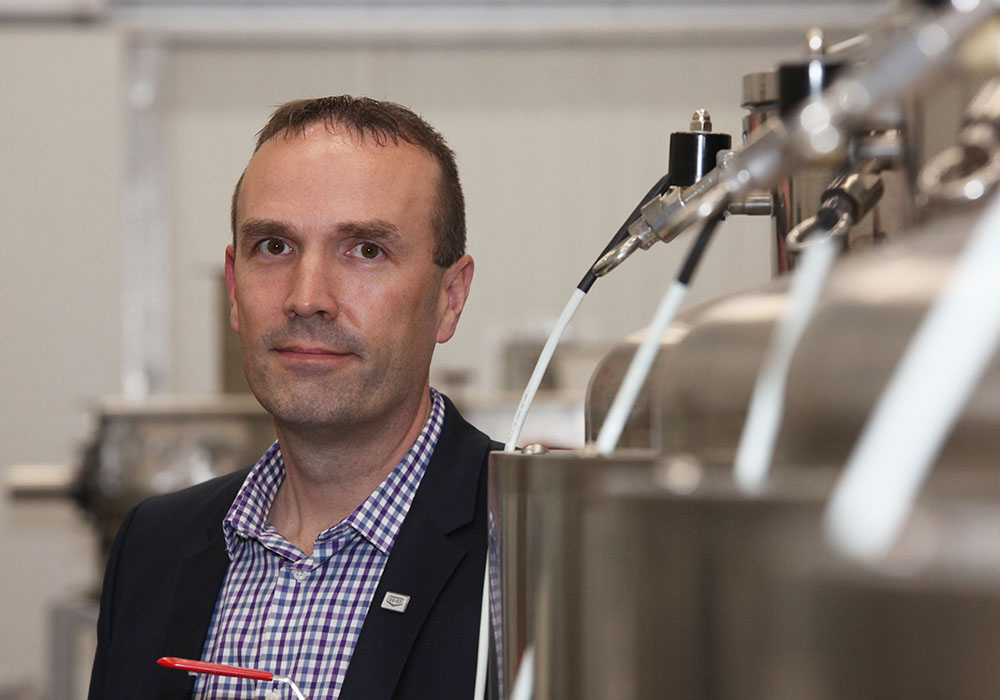Pecks of prairie-grown pickles will soon roll off the production line at the Saskatchewan Food Industry Development Centre in Saskatoon.
It’s part of a $500,000 push by Federated Co-op to support the growing food manufacturing industry in the province. The initiative was announced Oct. 2, at the start of Agriculture Month in Saskatchewan.
“We really believe we’re in a unique space where we’re partnering with producers in primary production, processing, distribution, and then ultimately to get products on the grocery shelves,” said Ron Healey, FCL’s vice-president of ag and consumer business.
“Our goal is to offer as many local nutritious products as we can through our grocery stores. We saw this as a great opportunity to partner with the Food Development Centre to expand the canning and condiment production to allow new products to come forward.”
FCL’s funding is part of the estimated $7.5 million project, which represents money from the federal and Saskatchewan government as well as industry.
The project is adding 12,300 sq. feet, about 20 percent, to the Food Centre, which will include a new bottling line and pasteurization system for canning low-acid foods and construction of more processing space.
The non-profit organization provides full service assistance to food processors wanting to ad value to their products for domestic and international markets.
Since 1998, the federal processing facility has assisted more than 300 companies in the development and processing of new food products, with more than 800 new products using Saskatchewan-based agricultural inputs.
Scheduled to be completed next year, the centre will create more opportunities for locally grown food to be processed and then sold by co-ops and other stores across Western Canada.
“The way it works is companies come in, they set and run their business out of the incubator space (one of six) for three years and then hopefully they’re at the size they can graduate out and go and build their own facility and do their own manufacturing,” said Dan Prefontaine, president of the centre.
Read Also

Volatile temperatures expected for this winter
DTN is forecasting a lot of temperature variability in the Canadian Prairies this winter. Precipitation should be close to average.
Last year, Healey said Canada imported about $87 million worth of pickles, compared to producing less than $3 million.
“This expansion here is going to allow us to move forward with a canning line that will allow us to bring forward Canadian-made, locally grown pickles. You’ll see those on the grocery stores at the co-ops in the coming weeks,” he said.
But it’s more than pickles on FCL’s production lineup.
“You name it, there’s a lot of products that will be coming forward thanks to this investment,” said Healey.
Major growth in vegetable and fruit producing acres is expected in the province soon, said Bryan Kosteroski, executive director of the Prairie Fresh Food Corp., which is collaborating with FCL’s product lineup.
“Now these producers will expand their acres in vegetables and fruits and have the opportunity to value add,” he said.
“You’re going to see a lot of crops changing and a lot more precise crops grown to meet the needs of the value add of the pickling lines and future processing of other vegetables for a finished product.”
The expansion couldn’t have come at a better time, said Paula Woodhouse of Riverbend Plantation of Saskatoon, a maker of jams and jellies sold through co-op stores.
“The opportunity that co-op gave us was incredible. When you get a big opportunity like that, there’s a lot of growing pains and we felt a lot of those growing pains, which would’ve been more had we not had the Food Centre.
“Now with this new production room, it changes the ballgame. It is going to be so much more efficient. Where we used to do 10 days of production, we might be able to get that down to two or three days,” she said.
Riverbend Plantations has been working with the Food Centre for about two years and as a smaller enterprise, Woodhouse said she could not have grown the business without its production line and expertise.
“The quantities and the volume that we need, to invest that much capital, it would have been really difficult.
“So with them being already in existence, having all the equipment and the expertise and the know-how, they made it possible for us to work with co-op,” she said.
She said the Food Centre has also allowed them to buy their fruit from other producers, which has grown markets for other prairie orchards.
“It’s all Canadian fruit, so it definitely benefits others besides us,” she said.
Added Healey: “You see an increasing demand of consumers who want to support local, to try and get the best quality product, the freshest quality product available. And certainly that comes from local.”
















